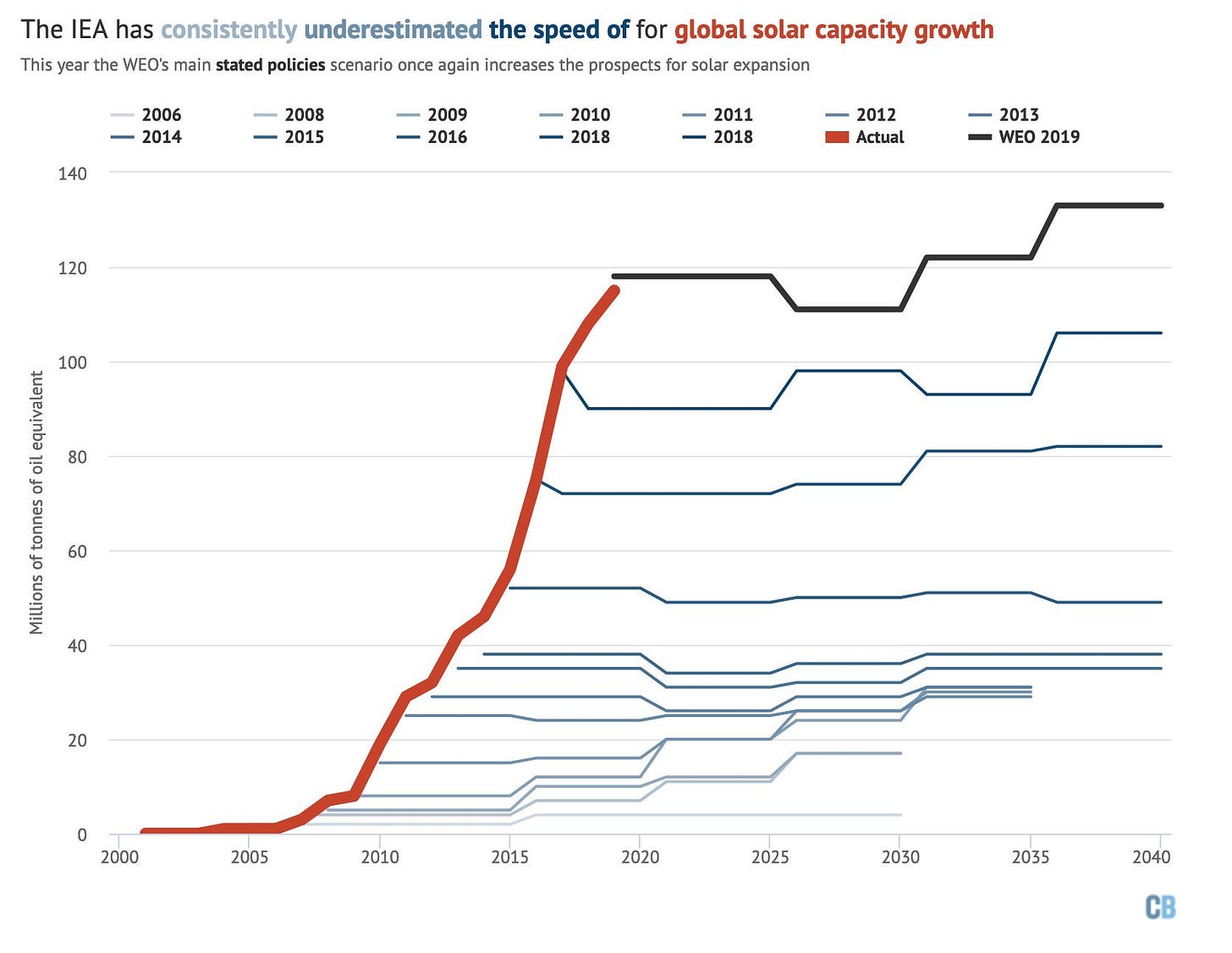Odds and Ends #3: Lefty in-fighting and good solar news
Plus a dispatch from Edinburgh, Large Language Models and more.

Hello! This is issue 3 of Odds and Ends, your round-up of interesting links, ideas and nonsense, designed to capture all of my stray observations and takes.
This newsletter-within-a-newsletter will be going behind a paywall when I launch a premium tier, as it’ll be a special bonus for subscribers sent out on Thursdays, to complement the main essay on Tuesdays.
So if you value my writing, and want me to write more, please be sure to upgrade your subscription to a pre-pledge. This tells me that when I do finally pull the trigger on going paid, I’ll still earn a living afterwards. I’m tantalisingly close to the numbers really adding up to make it a viable part of my business. So become an O’Malleyist and pre-pledge today!
And now… some links and stuff!
Cheems Britannia
One of my most tragic hobbies is commenting on local news stories in support of building houses. Obviously, this doesn’t make me popular with the other commentators, but I figure that someone needs to do it.
But as a result, now pretty much every story KentOnline posts turns up in my newsfeed. And when I saw this one, about a new branch of Poundstretcher opening in Gillingham, it just made me feel weirdly sad. Especially when viewed with the publication’s caption: “It’s great to see an empty unit filled."
Why? Because it perfectly captures the declinism that the O’Malleyist project is trying to overcome. Sure, any new shop is better than an empty unit – but it’s just more evidence that all town centres are now is a place for discount stores and economic hardship. I don’t mean this in a snobby classist way (one day I will write about my own relationship with class1) – but it seems very “cheems mindset” to celebrate a new Poundstretcher, like we can’t hope for any better.
And it goes back to what I was saying last week. We could aim so much higher, and revive the high street properly by densifying.
The Edinburgh Fringe is fun
For a work thing I’ll be able to talk more about soon, I spent 25 hours last week in Edinburgh, and was able to see a little of the Fringe. My only regret is that I wasn’t able to stay for longer, as it was my first time back in about 12 years (after a similarly brief visit then), and I really love the thrown-together, DIY attitude and the possibility of stumbling into something fun.
I was only able to catch two shows, but luckily they were both great.
Nick Doody performed his “Difficult Twelfth Album”, and made for a thoroughly entertaining hour of stand-up, touching on the particularly relatable themes for me being childless out of choice, and the unique vileness of the toilets on trains. Given that I’m mildly germaphobic2 and I’d just stepped off a five hour Lumo service from Kings Cross3, while sat behind an extremely annoying child, it really spoke to me.
Then later in the evening I caught Matt Hobs performing “Moontalker”, a stand-up show about the Moon landings. This was very much my sort of thing – highlighting some of the quirkier aspects of the Apollo missions, and reading what I can safely say is a truly unexpected excerpt from Michael Collins’ autobiography.
Anyway, both shows are still running until the end of the month, so go see ‘em. Maybe next year I’ll go back for a little longer, and try to see a bit more.
Catching up with the weird world of LLMs (Simon Willison)
If you have a spare 40 minutes, this talk by Simon Willison (who had a hand in numerous web technologies that are ubiquitous today) is well worth your time. He really captures the utter weirdness of the large language models that power the likes of ChatGPT. He argues that it is like aliens landed and handed us a mysterious USB drive containing a massive file full of numbers. Because that’s all a large language model really is.
The two kinds of progressives (Matt Yglesias)
I can’t find an elegant pull quote to sum up Matt’s argument in this piece but it is really worth reading, as it captures a really persistent divide on the left of the political spectrum, on both sides of the Atlantic.
Simply put, Matt sketches out the current progressive orthodoxy in the US, which puts certain identity issues outside of realms of ‘normal’ political horse-trading, and thus makes compromise impossible. And what’s striking is that this status quo is pretty novel, compared to relatively recent history. And like Matt, I share the view that this shift has been broadly bad for progressives, not least because it puts material economic concerns at a disadvantage compared to more abstract gesture politics.
(The divide also maps pretty neatly on to the woke divide I describe here).
The Rise of the Young, Liberal, Nonwhite Republican (Eric Levitz)
[T]he New York Times-Siena College poll also gives Democrats some cause for anxiety. The survey suggests that nonwhite, working-class Americans are starting to vote more like their light-skinned peers. In 2020, nonwhite, non-college-educated voters backed Joe Biden over Trump by a 48-point margin. Today, this group backs by Biden by merely 16 points, according to the survey. This erosion in the Democrats’ support among nonwhite voters leaves Biden and Trump tied at 43 percent nationally.
The realignment of some nonwhite voters appears to be partially driven by self-identified conservatives cutting ties with the party of their parents in favor of the one best aligned with their social views.
On a related note, this piece from Eric Levitz is really interesting and counter-intuitive, given Donald Trump isn’t exactly known for his agreeable views on minorities. But it is striking to note that perhaps the the ‘Great Awokening’ has not been electorally cost-free, and now American progressives are facing an electoral penalty for moving so far ahead of public opinion.
EU blindsided by ‘spectacular’ solar rollout (Politico)
Explosive growth in solar power means most EU countries will hit their 2030 renewable energy targets ahead of time, new data shows, fuelling optimism on efforts to bring down global emissions.
The bloc added 41 gigawatts of new solar capacity in 2022 — a 40 percent increase on 2021. That's expected to rise to over 50 GW this year.
Some 23 countries are slated to reach their solar installation targets by 2027, according to data from the SolarPower Europe lobby group based on the latest available national targets and shared with POLITICO.
Some very pleasing solar news from the EU. The energy transition is happening! Though perhaps we shouldn’t be surprised, as solar capacity growth has been consistently underestimated by the people who estimate these things. As evidenced by this incredible chart of predictions vs reality for the past decade or so:

If the UK has lots of renewables, why do electricity prices follow gas prices? (Hannah Ritchie)
And finally, Hannah Ritchie has an incredibly good Substack where she picks through some of the trickiest questions around sustainability/climate and explains what is actually going on or how stuff really works. And I really liked her piece about the energy market here – which succinctly and clearly why the prices per kilowatt hour of renewable energy is tethered to the price of gas.
I think this underscores my pro-nuclear views – if we could replace gas with nuclear, presumably prices would be not just lower, but more consistent as they would not be at the mercy of Russia/other countries. And that would have the downstream impact of making the price of solar/wind/wave/geothermal electricity more predictable too.
And that’s it for this week. Don’t forget to go check out this week’s big essay, in which I really stick it to the astrologers (always tackling the big issues here). Or dig into the archives and find out why you should stop letting Elon Musk break your brain.
And don’t forget to pre-pledge to tell me that you like my writing and would like to use money to obtain more of it.
I need a hook so if a Tory MP could say something terrible about the Post-1994 universities I’d really appreciate it.
I know, germaphobia… in this day and age.
The O’Malleyist angle on this is that we could choose to have palatially nice toilets on trains if we’d make the political choice to do so, and put up the cash/write the contracts and rules to make it happen. We can aspire to soap dispensers that contain soap!





Post-1992 universities, ITYF. :)
The problem with the debates about whether liberals are not willing to compromise is the false equivalence.
Generally on the liberal side, these fundamental beliefs are about wanting to ensure people can live their lives how they want without fear of persecution or harassment.
Whereas on the right they are passing law banning people living lives how they want, restricting voting rights for people who disagree with them and in extreme cases resulting to violence (see the murder on Friday which has been suggested was due to someone flying a pride flag)
And yet (some) liberals are the problem because they won't compromise?